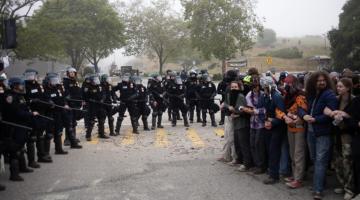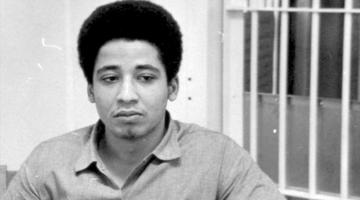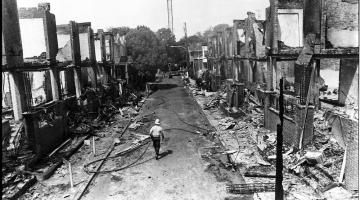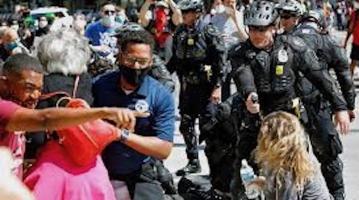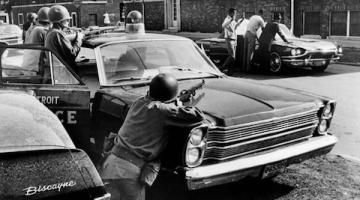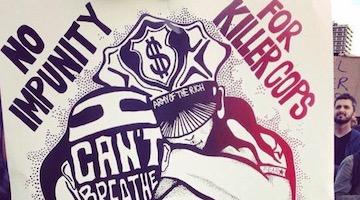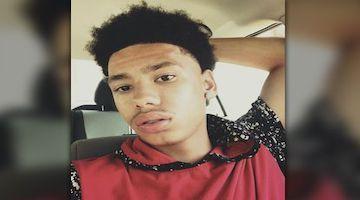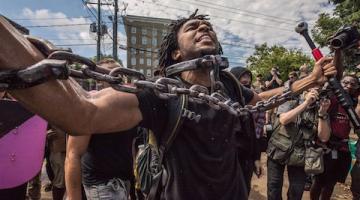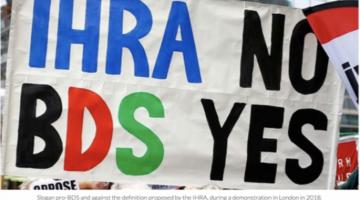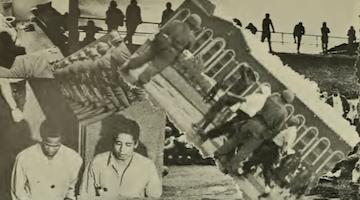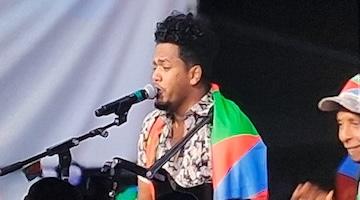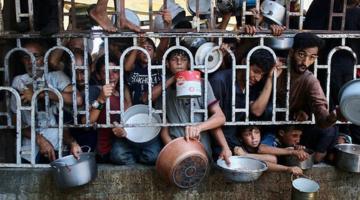Still Missing and Murdered: Atlanta’s Lost Children Address Today’s Plague of Police Violence
The docu-series reveals not only the ongoing predation against the Black community, but that policing is about social control, not crime control.
“The abductions and murder of black children are acts of terror against the black community as a whole.”
The past is not over, as they say, it simply accumulates. But what happens when it spills over or starts to split the seams? “Maybe it just sags like a heavy load,” as Langston Hughes famously put it, weighing the costs of a dream deferred, “Or does it explode?” The movement against antiblack racism requires a long historical perspective. The massive outrage and protests over the continued killings of black people by police officers and everyday white people in the Spring of 2020 effectively brought an abrupt end to the COVID-19 stay-at-home orders. The recent five-part documentary series Atlanta’s Missing and Murdered: The Lost Children reminds us that today’s antiblack violence is connected to the calamity of 1979-1981 when at least 30 black boys and girls were mysteriously abducted and murdered in the so-called New South’s self-proclaimed “city too busy to hate.” Released by HBO in the midst of this spring’s particularly gruesome twin public health crises of police killings and the COVID-19 pandemic, Atlanta’s Missing and Murdered purports to uncover new ground in the landmark case. Coinciding with Atlanta Mayor Keisha Lance Bottoms’ announcement in March 2019 that she and Atlanta Chief of Police Erika Shields were re-opening investigation into the 40-year old case, the docu-series provides viewers with the opportunity to see how elements of today’s protests against the Ahmaud Arbery, Breonna Taylor, and George Floyd killings (among many others) resonate across the generations. Let us consider the resonance in five parts.
1 / Atlanta’s Missing and Murdered is rich with archival footage, including interviews and news reports from the period. Images of the deceased are also prominently reproduced in the film. Photos depicting dead children discarded in the brush as so many objects of misuse are very hard to look at. Re-broadcasting the scenes of black death raises the conundrum playing out today in our multi-media-saturated world. On the one hand, the burgeoning digital archive of police violence against black people, since at least the assault on Rodney King in 1991, conjoins a longstanding historical reality wherein society does not acknowledge antiblack violence until and unless there is non-black corroboration. Personal testimony by black people across the generations has never been sufficient to confirm the existence of a problem for the larger society. In eighteenth and nineteenth century abolitionism, it was through images produced by whites such as the slave ship Brooks and the scourged back of the fugitive that non-black society found reason to oppose slavery. Today’s video recordings of police actions likewise allow non-blacks to verify the violence and take a stand against it. Indeed, even with the damning video evidence, holding police accountable in a particular case remains a long-shot—but doing so without such evidence is virtually impossible.
On the other hand, if the video evidence buttresses non-black voices rather than black ones, then what does it do for or to black people? What is the effect of re-broadcasting the scenes of black death and suffering, from Atlanta to the present? As the HBO film makes clear, the abductions and murder of black children are acts of terror against the black community as a whole. The same goes for today: each and every individual case of police violence is endured by all black people as a collective trauma. The viral circulation of these images is thus at once the reproduction of communal injury. Society has entered a moment of enhanced exposure of systemic racism and antiblack violence across all media—Atlanta’s Missing and Murdered is part of this trend. We cannot take for granted, however, that all of this exposure is productive for black liberation.
“Society does not acknowledge antiblack violence until and unless there is non-black corroboration.”
One example of bad exposure is the other prominent popular media portrayal of the Atlanta case streaming online today, Netflix’s Mindhunter. This dramatic series came out in 2019 and features fictional FBI agents who are depicted interviewing actual historical serial killers in prison to study their methods and mental make-up in order to develop a forensic psychology that might be useful in solving serial murder cases. During season two, the agents are pulled away from their research to consult on an active case, the Atlanta child murders. The FBI agents in Mindhunter insist, as they did in the real case, that it is a serial murder case, and that the serialist’s profile is a young black man. The black community in Atlanta, on the other hand, argues that the case fits a different kind of historical pattern of mass disappearances and murder, and that the authorities are not following the evidence that points in this direction. While Mindhunter does hint at the police suppression of evidence (something the HBO documentary verifies), the narrative arc of the show encourages the impression of a professional investigation, of Wayne Williams as a psychopath, and of the black community as irrational in its belief that institutions hostile or indifferent to black life had something to do with the murders—especially when the show situates the Atlanta case alongside the likes of notorious serial murderers Charles Manson, David Berkowitz (Son of Sam), and Dennis Rader (the BTK Strangler). Mindhunter is not a productive representation of the forces standing in the way of black liberation, therefore, despite spending the majority of season two on the Atlanta case. The show exploits black struggle by conforming to state narratives that seek to narrow our conception of justice to what is achievable through the criminal law, rather than through independent communal self-determination, and that focus our attention on individual perpetrators of interpersonal violence, rather than the historical structures that render black people vulnerable to a violence without limit or remedy.
2 / Atlanta’s Missing and Murdered also registers the significance of the black family to the communal resistance against impunity. Fathers organized community patrols, while the mothers of the disappeared children pressured the city to do something about the violence. The HBO film replays many of the interviews with the mothers from the period, prompting our reflection on black mothers across time. The Atlanta mothers bring to mind Mamie Till-Mobley who insisted on an open casket funeral for her mutilated son Emmett so that the entire world would see the brutal handiwork of white supremacy in 1955. The Atlanta mothers are also connected to the mothers of the Central Park Five, the five young black teenagers railroaded for crimes they did not commit in 1989. The Atlanta mothers repeatedly claimed that “the city is an accessory to murder,” pushing a social analysis of the case that contradicted the official version of a lone serial murderer. The mothers’ analysis reminds us that the families victimized by state violence today press on against police impunity long after the news headlines and social media have passed on to the next case. Atlanta’s Missing and Murdered, as well, portrays the tremendous toll that this struggle takes on the families, a price poignantly illustrated by the premature death of Erica Garnerin 2017. Across the generations, every black leader or activist is embedded within a black family that inevitably absorbs the brunt of the system’s intransigence. The ongoing tragedy of Malcolm X’s family, for instance, shows that the trauma endured within the black family remains the primary site at which black oppression occurs.
3 / The HBO film also reminds us that city officials’ primary concern in the Atlanta case was not justice for the aggrieved, but rather mitigating the bad publicity of an outraged and riotous black community that could damage the city’s business interests. Unceremoniously closing the case with the dubious conviction of Wayne Williams was thus a thinly veiled anger management strategy. In the midst of the COVID-19 pandemic’s public health protocols today, we see a similar effort to quarantine the indignant and righteous response to state violence. When Atlanta rose up in May 2020 in outrage over the Arbery, Taylor, and Floyd killings, Mayor Bottoms gave a passionate speech that did not condemn police violence, but rather rebuked the protestors. Bottoms’ predecessor, Mohammed Karim Reed, had also attempted to quell the protests that broke out in 2016 in response to the police killings of Alton Sterling and Philando Castile. Toni Cade Bambara, the late author and filmmaker, who was raising her daughter in Atlanta during the missing and murdered case, documents such treachery from black city officials in her compendium on the case, Those Bones Are Not My Child. Likewise, former chairwoman of the Black Panther Party, Elaine Brown, is equally scathing in her critique of Atlanta’s black elite for its part in abandoning working class black people to the war on drugs, in the displacements caused by urban renewal programs, and in the re-segregation of Atlanta’s education system.
“Mayor Bottoms gave a passionate speech that did not condemn police violence, but rather rebuked the protestors.”
The final episode of Atlanta’s Missing and Murdered carefully deconstructs the state’s case against Williams. After Williams’ appeal for a retrial is denied, William Kunstler opined that sacrificing Williams was a calculated move to keep the peace in a brewing race war. If a white person had been indicted, Kunstler said, the city and perhaps the nation would have erupted. Whether Kunstler was correct in his assertion we will never know, but it does say a lot about the fear of black violence and the latitude permitted white violence. Similarly, Mayor Bottoms’ effort at corralling black rage backfired a few weeks later when an Atlanta police officer killed Rayshard Brooks on June 12, 2020, sending thousands back into the streets, “burnin’ and a-lootin’…burnin’ all illusion,” as Bob Marley famously sang. Bottoms was forced to call for the firing of the officer and to accept the resignation of police chief Shields—all part of the anger management strategy. Re-opening the missing and murdered case forty years later, in the midst of today’s police actions that are still rendering black people missing and murdered, is opportunistic and impairs people’s ability to think through the problems they face. As the Atlanta survivors interviewed in the film observed, closure is impossible for the black community.
4 / After two black men were lynched in June 2020 in Antelope Valley, CA, a black resident there shared: “I don’t care about the KKK because I’m allowed to defend myself against the KKK. But every day I have to leave the house, not knowing if I’m going to get pulled over that day and if that could end up in an escalated situation with me actually not coming home.” This sentiment addresses one of the more straightforward issues on display in Atlanta’s Missing and Murdered: that self-determination is a function of both self-defense and self-care. The black community in Atlanta organized searches for missing children; it gathered evidence and conducted press conferences to share forensic leads of its own with the media and the public, long before crowdsourcing became a thing; and it formed self-defense units. Led by fathers who were Vietnam vets, the self-defense units were slandered as vigilantes and arrested by the police. Black communities have always had to arm themselves to survive white aggression. The famous non-violent civil rights marches were only possible because of armed security units such as the Deacons for Defense. The missing and murdered case, however, occurred in the aftermath of COINTELPRO, the FBI’s counter-intelligence program that sabotaged the civil rights movement in its various forms. The community’s ability to protect itself was thus severely attenuated, especially in the face of law enforcement’s intimate relationship with the Klan.
Self-defense in the post-civil rights era is more complex. For four hundred years of slavery and one hundred years of Jim Crow, all whites were deputized to police all blacks. It has only been in the last fifty years that this antiblack policing function has formally shifted to the state. When the Atlanta case happened, this transition had barely begun. Forty years later, however, Robert Fuller and Malcolm Harsch swinging from nooses in southern California are reminders that the transition is merely formal, not substantive—the primary threat to black life still comes from society itself, not from the cops or from the Klan.
5 / The question remains for today’s protest movements, what defense is possible against the police? Atlanta’s Missing and Murdered reiterates that policing is about social control, not crime control. The racial disparities at all levels of the criminal justice system, combined with the weft of criminal activity that goes relatively un-policed and is practically decriminalized, means that people are policed for who they are, not for what they do. Criminalization is less a function of behavior—breaking the law—and more a reflection of race and class status. This means that policing is the manifestation of power situated elsewhere in society, an analysis with ramifications for today’s protest movement against the police. The call for defunding municipal police departments as a way of addressing the problems with policing fails to appreciate the critical social control purpose of the police, as well as the diffuse manner in which social control functions. A smaller police department does not take social control out of the hands of the state. There will be more private police forces and county- and state-level police, as well as an expansion of the policing powers of various other state agents, such as housing, parks and recreation, welfare, health, and education departments. President Trump’s recent use of an elite Border Patrol unit against police protestors in Portland, OR may appear like political theater, but it is also just the tip of a very big policing apparatus iceberg.
“A smaller police department does not take social control out of the hands of the state.”
The HBO documentary reveals this social control function of policing by showing that the story of the missing and murdered case continues long after justice has been officially reached. It was revealed during Williams’ appeal for a retrial in 2004 that the Georgia Bureau of Investigation had collected surveillance tapes of known Klan members, but that the evidence was destroyed during the original trial. The appeal for retrial also revealed that police ignored other evidence such as white pubic hairs found on some of the victims and eyewitness descriptions of abductors that matched known Klan ex-convicts—evidence that would have directly contradicted the state’s narrative that the killer had to be black. The point the film makes available here is that one of the core problems with policing is the state’s exclusive access to information. The black freedom movement has long been familiar with this issue. When Fred Hampton was assassinated in 1969 by Chicago police (working with the FBI), the Black Panther Party conducted guided tours of the crime scene, allowing the community to verify for itself that the city’s official account of Hampton’s death, that he died during a shoot-out instigated by the Panthers, was a lie. The state was more adept in its suppression of evidence in the Malcolm X assassination in 1965, as historians have long claimed. By determining what evidence is collected or destroyed, the police advance their social control aims, even at the expense of crime control.
The state’s monopoly over evidence gets at the crux of the police shooting crisis today. Police cannot impartially gather evidence against themselves—which is precisely the value of the bystander video record. The families and communities of survivors have little recourse against such total control over information, and must resort to costly protracted legal battles and political pressure to force the state to turn over key evidence of police criminality, as the Laquan McDonald case in Chicago showed recently. Today’s protest movements against police violence need to heed this lesson of the Atlanta missing and murdered case. Defunding municipal police departments will change little—not only because their role will then be filled by other state and private agents, but because without community control over information and the adjudication of evidence the police power remains intact.
Thank you to Deborah Bowen and Khalil Saucier for helpful feedback on this essay.
Tryon P. Woods teaches crime and justice studies at the University of Massachusetts, Dartmouth and black studies at Providence College. He is the author of Blackhood Against the Police Power: Punishment and Disavowal in the "Post-Racial" Era (MSU 2019).
COMMENTS?
Please join the conversation on Black Agenda Report's Facebook page at http://facebook.com/blackagendareport
Or, you can comment by emailing us at comments@blackagendareport.com

